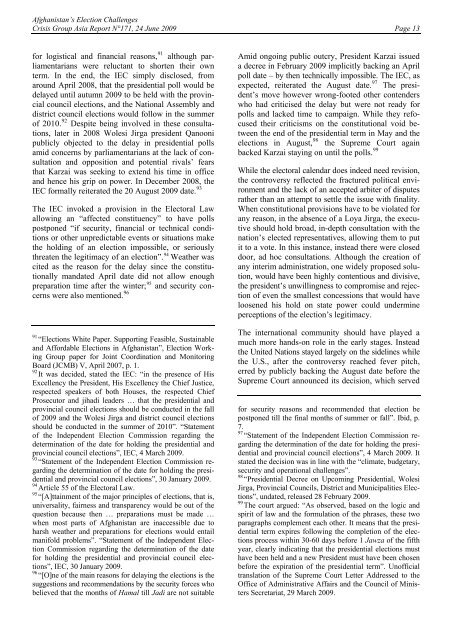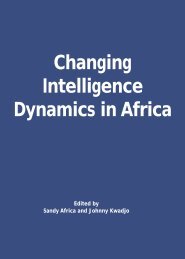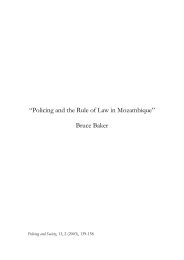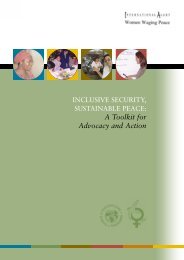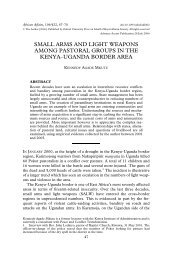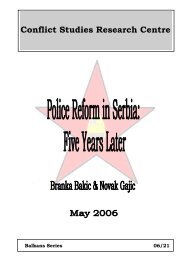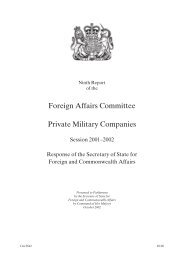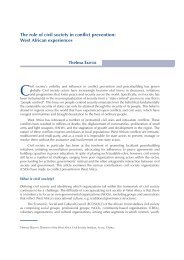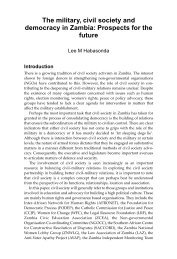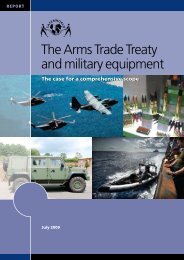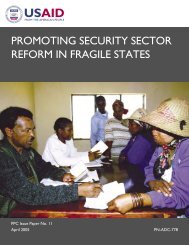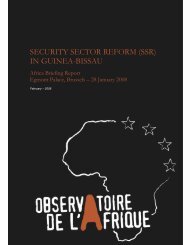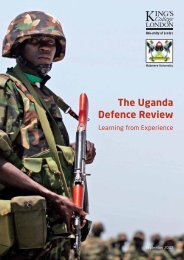AFGHANISTAN'S ELECTION CHALLENGES
AFGHANISTAN'S ELECTION CHALLENGES
AFGHANISTAN'S ELECTION CHALLENGES
Create successful ePaper yourself
Turn your PDF publications into a flip-book with our unique Google optimized e-Paper software.
Afghanistan’s Election Challenges<br />
Crisis Group Asia Report N°171, 24 June 2009 Page 13<br />
for logistical and financial reasons, 91 although parliamentarians<br />
were reluctant to shorten their own<br />
term. In the end, the IEC simply disclosed, from<br />
around April 2008, that the presidential poll would be<br />
delayed until autumn 2009 to be held with the provincial<br />
council elections, and the National Assembly and<br />
district council elections would follow in the summer<br />
of 2010. 92 Despite being involved in these consultations,<br />
later in 2008 Wolesi Jirga president Qanooni<br />
publicly objected to the delay in presidential polls<br />
amid concerns by parliamentarians at the lack of consultation<br />
and opposition and potential rivals’ fears<br />
that Karzai was seeking to extend his time in office<br />
and hence his grip on power. In December 2008, the<br />
93<br />
IEC formally reiterated the 20 August 2009 date.<br />
The IEC invoked a provision in the Electoral Law<br />
allowing an “affected constituency” to have polls<br />
postponed “if security, financial or technical conditions<br />
or other unpredictable events or situations make<br />
the holding of an election impossible, or seriously<br />
threaten the legitimacy of an election”. 94 Weather was<br />
cited as the reason for the delay since the constitutionally<br />
mandated April date did not allow enough<br />
preparation time after the winter; 95 and security concerns<br />
were also mentioned. 96<br />
91 “Elections White Paper. Supporting Feasible, Sustainable<br />
and Affordable Elections in Afghanistan”, Election Working<br />
Group paper for Joint Coordination and Monitoring<br />
Board (JCMB) V, April 2007, p. 1.<br />
92 It was decided, stated the IEC: “in the presence of His<br />
Excellency the President, His Excellency the Chief Justice,<br />
respected speakers of both Houses, the respected Chief<br />
Prosecutor and jihadi leaders … that the presidential and<br />
provincial council elections should be conducted in the fall<br />
of 2009 and the Wolesi Jirga and district council elections<br />
should be conducted in the summer of 2010”. “Statement<br />
of the Independent Election Commission regarding the<br />
determination of the date for holding the presidential and<br />
provincial council elections”, IEC, 4 March 2009.<br />
93 “Statement of the Independent Election Commission regarding<br />
the determination of the date for holding the presidential<br />
and provincial council elections”, 30 January 2009.<br />
94 Article 55 of the Electoral Law.<br />
95 “[A]ttainment of the major principles of elections, that is,<br />
universality, fairness and transparency would be out of the<br />
question because then … preparations must be made …<br />
when most parts of Afghanistan are inaccessible due to<br />
harsh weather and preparations for elections would entail<br />
manifold problems”. “Statement of the Independent Election<br />
Commission regarding the determination of the date<br />
for holding the presidential and provincial council elections”,<br />
IEC, 30 January 2009.<br />
96 “[O]ne of the main reasons for delaying the elections is the<br />
suggestions and recommendations by the security forces who<br />
believed that the months of Hamal till Jadi are not suitable<br />
Amid ongoing public outcry, President Karzai issued<br />
a decree in February 2009 implicitly backing an April<br />
poll date – by then technically impossible. The IEC, as<br />
expected, reiterated the August date. 97 The president’s<br />
move however wrong-footed other contenders<br />
who had criticised the delay but were not ready for<br />
polls and lacked time to campaign. While they refocused<br />
their criticisms on the constitutional void between<br />
the end of the presidential term in May and the<br />
elections in August, 98 the Supreme Court again<br />
99<br />
backed Karzai staying on until the polls.<br />
While the electoral calendar does indeed need revision,<br />
the controversy reflected the fractured political environment<br />
and the lack of an accepted arbiter of disputes<br />
rather than an attempt to settle the issue with finality.<br />
When constitutional provisions have to be violated for<br />
any reason, in the absence of a Loya Jirga, the executive<br />
should hold broad, in-depth consultation with the<br />
nation’s elected representatives, allowing them to put<br />
it to a vote. In this instance, instead there were closed<br />
door, ad hoc consultations. Although the creation of<br />
any interim administration, one widely proposed solution,<br />
would have been highly contentious and divisive,<br />
the president’s unwillingness to compromise and rejection<br />
of even the smallest concessions that would have<br />
loosened his hold on state power could undermine<br />
perceptions of the election’s legitimacy.<br />
The international community should have played a<br />
much more hands-on role in the early stages. Instead<br />
the United Nations stayed largely on the sidelines while<br />
the U.S., after the controversy reached fever pitch,<br />
erred by publicly backing the August date before the<br />
Supreme Court announced its decision, which served<br />
for security reasons and recommended that election be<br />
postponed till the final months of summer or fall”. Ibid, p.<br />
7.<br />
97 “Statement of the Independent Election Commission regarding<br />
the determination of the date for holding the presidential<br />
and provincial council elections”, 4 March 2009. It<br />
stated the decision was in line with the “climate, budgetary,<br />
security and operational challenges”.<br />
98 “Presidential Decree on Upcoming Presidential, Wolesi<br />
Jirga, Provincial Councils, District and Municipalities Elections”,<br />
undated, released 28 February 2009.<br />
99 The court argued: “As observed, based on the logic and<br />
spirit of law and the formulation of the phrases, these two<br />
paragraphs complement each other. It means that the presidential<br />
term expires following the completion of the elections<br />
process within 30-60 days before 1 Jawza of the fifth<br />
year, clearly indicating that the presidential elections must<br />
have been held and a new President must have been chosen<br />
before the expiration of the presidential term”. Unofficial<br />
translation of the Supreme Court Letter Addressed to the<br />
Office of Administrative Affairs and the Council of Ministers<br />
Secretariat, 29 March 2009.


